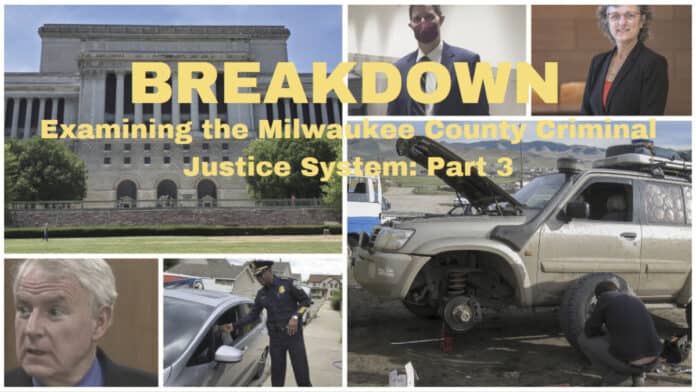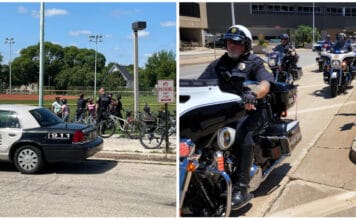PART THREE IN AN 11-PART SERIES. See parts 1 (on COVID policy changes imperiling public safety) and 2 (on the Collins Agreement).
Milwaukee County’s criminal justice system has broken down at almost all levels.
Although some of the breakdown can be attributed to the pandemic, some can not. Local officials’ questionable policy decisions also play a role, and it’s imperiling public safety. The pandemic exacerbated some already existing trends and caused others, but officials have not developed effective strategies to recover. Some non-pandemic-related issues, like the ACLU-related Collins Agreement’s impact on proactive policing and plummeting numbers of police officers (down 26% since 1996) have been largely overlooked in the media.
PROBLEM #3: The number of crimes in Milwaukee County in serious categories have risen since 2018, driven by the City of Milwaukee and fueled by dramatic spikes in motor vehicle thefts and homicides. While the latter have been widely covered, a new report provides the interesting data points to further understanding of the problem, so we decided to break the issue out into its own story.
For example, the City of Milwaukee accounts for 68% and 76% of the most serious crimes committed in Milwaukee County each year, and motor vehicle thefts exploded dramatically in 2021 but are now starting to decline.
Reported drug offenses dropped 31% (at a time of spiraling overdoses), and weapons law violations and intimidation skyrocketed. Numbers on things like drug offenses can be affected by lack of enforcement by police. [Note: tomorrow we will explore the MPD’s plummeting arrest numbers.]
We would note that intimidation may be up because accused offenders are on the streets for longer before trial, due to backlogs and jail overcrowding and other issues, so witnesses and victims may feel more threatened if they testify.

- Our note: The City of Milwaukee’s crime dashboard provides updated totals for 2023. Homicides and motor vehicle thefts are among crime categories continuing to decline this year over 2022 at this time. Aggravated assault, theft and arson are also dropping. However, non-fatal shootings, carjackings, burglary, human trafficking, rape and robbery are up in 2023 year-to-date when compared to this time last year.
THE SERIES: We have taken the lead in exploring the problems in Milwaukee County’s Criminal Justice system, breaking stories on Milwaukee police staffing declines (which started years ago), the DA’s high non-prosecution rate and new reliance on summonses, the ACLU Collins Agreement’s deleterious effect on proactive policing, new jail and police policies restricting bookings and arrests, and the massive court backlogs, which leave defendants on the streets longer to re-offend and which provoke constitutional concerns. Milwaukee is at a crisis point, with record homicide numbers and a severe reckless driving crisis.
Now, a new August 2023 report from the Wisconsin Policy Forum has examined Milwaukee County’s Criminal Justice System in great detail, providing fresh data from 2018 (before the pandemic) to 2022. We are excerpting some of the key statistical findings in an 11-part series to further understanding of the problem. You can’t formulate solutions if you don’t understand the problem’s scope. The few news articles that emerged only superficially skimmed over the report’s findings.
Although the report deals with the context of the pandemic, it also makes it clear that, in many respects, trends imperiling public safety started before it or have continued, even escalating in some cases, in 2022, after its height. In other words, you can’t blame everything on the pandemic. The report also indicates that, in a number of ways, problems that escalated during the pandemic have not been resolved by officials even as late as 2022.
In each article, which we will run over 11 days at 7 a.m. every day, we will outline the problems and present the research, keeping rhetoric out of the way. After that, we will run a wrap-up article suggesting solutions. What happens in the state’s largest county has an effect throughout Wisconsin. The WPF report was commissioned by the Milwaukee-based Argosy Foundation and the Milwaukee Community Justice Council (CJC). In this series, we hope to get past simplistic rhetoric (“it’s the state Legislature’s fault!” or “who cares what happens in Milwaukee!”) and focus on data.
PROBLEM #3: Motor Vehicle Theft & Murder Explode
The report analyzed crime trends in two categories.
Within the Uniform Crime Reporting System, known as UCR, crime is separated into two categories. Part 1 crimes, according to the FBI, are “serious crimes” that “occur with regularity in all areas of the country” and “are likely to be reported to the police.” These crimes include criminal homicide (all murder and manslaughter cases), forcible rape, robbery, aggravated assault, burglary, larceny theft, motor vehicle theft, and human trafficking, the report says.
Part 2 crimes include all other offense types tracked by the UCR, “including simple assault, forgery and counterfeiting, fraud and embezzlement, stolen property, vandalism, weapons, prostitution, sex offenses, drug violations, gambling, offenses against the family and children, driving under the influence, disorderly conduct, and others. While most law enforcement agencies collect arrest data on both Part 1 and Part 2 crimes, data on offenses are only reported publicly for Part 1 crimes,” the report says.

The report notes that it “analyzed trends on offenses and arrests across the 21 Milwaukee County law enforcement agencies, breaking them out into Part 1 and Part 2 crimes where possible.”

The report found:
- Part 1 offenses are up slightly over the last five years and spiked in 2021.
- From 2018 to 2020, Part 1 offenses totaled between 33,000 and 36,500 annually, before jumping to 44,795 in 2021 and subsequently declining back down to 37,822 in 2022.
- The report shows that, when comparing 2022 to 2018, offenses in these categories were higher in number: motor vehicle theft, aggravated assault, murder and non-negligent manslaughter, and manslaughter by negligence (human trafficking data was not collected in 2018).
- In the same time frame, there were fewer offenses in these categories: larceny theft, burglary, robbery, rape, arson (almost level).
- The 2021 spike was driven by motor vehicle theft, when there was a 300 percent increase. Motor vehicle thefts have started to decline.
- The increase in murder was also noted by the report’s authors (the city of Milwaukee recorded historic homicide highs in recent years).
- MPD logged between 68% and 76% of all Part 1 offenses in the county across each of the past five years, so the city tends to drive the county-wide trends.
- “When we look in greater detail at data from the 20 other law enforcement agencies in the county, we find divergent trends,” the report says. “In these agencies, Part 1 offense counts have been remarkably consistent over time – in no year were there fewer than 9,300 offenses or more than 10,600 offenses. However, offense totals peaked in 2019, and have fallen in each year since, reaching a low of just 9,350 in 2022.”
- Relative to 2019, “the only offense categories that showed increases for the non-MPD agencies in 2022 were motor vehicle thefts and robberies, which saw an 8.1% jump (from 197 to 213).”
The report also analyzed Part 2 offenses for the MPD only.
- “The MPD data show that Part 2 offenses increased by 26.4% from 2018 to 2022 (from 19,074 to 24,106). The increase was particularly sharp in 2021, when the number of Part 2 offenses escalated from the previous year’s 21,978 to 25,188, before declining by about 1,100 in 2022.
- The largest categories of Part 2 offenses in Milwaukee are “weapons law violations (7,125 in 2022), destruction/damage/ vandalism (5,390), simple assaults (5,046), intimidation (3,327), and drug and narcotics violations (1,266). Together, those five
categories accounted for 92% of Part 2 offenses in the city last year… substantial increases from 2018 to 2022 in weapons violations (+122%), intimidation (+81%), and destruction/damage/vandalism (+57%) accounted for much of the overall increase. Simple assaults declined by 6% over the same time period, while drug and narcotics violations dropped by 31%.
Read part 4 tomorrow on plummeting arrests and clearance rates.
Table of Contents



















![WATCH: Elon Musk Town Hall Rally in Green Bay [FULL Video]](https://www.wisconsinrightnow.com/wp-content/uploads/2022/04/Elon_Musk_3018710552-356x220.jpg)



![The Wisconsin DOJ’s ‘Unlawful’ Lawman [WRN Voices] josh kaul](https://www.wisconsinrightnow.com/wp-content/uploads/2025/03/MixCollage-29-Mar-2025-08-48-PM-2468-356x220.jpg)










